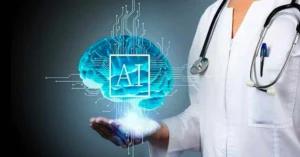AI (artificial intelligence) is changing many areas, and industry is no exception. Integrating artificial intelligence into quality control is one of the most important steps forward in this field. Quality control is an important part of manufacturing as it ensures that products meet specific standards and meet customer expectations. AI improves these processes by making them more accurate and efficient and predicting what will happen next. This article discusses how artificial intelligence is changing quality control in manufacturing, including its advantages, disadvantages, and future developments.
The Role of AI in Quality Control
Artificial intelligence is very important in today’s quality control as it can automate the inspection process, look at huge data sets, and detect defects with high accuracy. Manual inspection is a common part of traditional quality control methods, which can be time-consuming and lead to errors. Artificial intelligence, on the other hand, uses computer vision and machine learning algorithms to perform inspections faster and more accurately. These systems can spot even the smallest defects that people might miss, helping to meet better quality standards.
Benefits of AI in Quality Control
There are many benefits to using artificial intelligence in quality control. One of the main benefits is greater accuracy. Artificial intelligence (AI) systems can inspect shipments very carefully and detect defects that human inspectors cannot. This makes the item better and reduces the chance of a customer receiving a damaged item. AI can also plan repairs. AI systems can look at data from factory equipment to determine when a machine is likely to break down or produce a defective product. This allows manufacturers to perform maintenance before problems arise, reducing downtime and avoiding costly disruptions. AI also makes quality control more consistent. Human testers may not all be as skilled as each other, and they may miss questions due to fatigue or lack of concentration. AI systems, on the other hand, perform consistent checks throughout the output process and maintain the same high standards. This ensures that every product meets the required high standards.
Real-World Applications of AI in Quality Control
Artificial intelligence is being used in many manufacturing companies to improve quality control. Vision systems powered by artificial intelligence inspect parts and components in the automotive industry to ensure they meet strict safety and quality standards. These systems can detect defects such as cracks, deformations, and surface imperfections with great accuracy. Artificial intelligence is used to inspect printed circuit boards and other components in the electronics industry. Traditional inspection methods can miss small defects in complex electronic assemblies. On the other hand, AI systems can inspect these parts in detail to ensure that only perfect items are shipped to customers. AI can also help the food and beverage industry with quality control. AI systems check shipments for contamination, poor packaging, and incorrect information on labels. This ensures that customers receive safe goods with the correct labels, increasing customer satisfaction and compliance.
Challenges of AI in Quality Control
While there are many benefits to using artificial intelligence in quality control, it also comes with some problems. One of the biggest problems is that AI systems are initially very expensive to set up. To develop and use artificial intelligence technology, a lot of money needs to be spent on equipment, software, and training. However, the long-term benefits of greater accuracy and efficiency often offset the initial costs. There are also concerns about the impact of artificial intelligence on the labor market. If AI systems take over inspection tasks, inspectors could lose their jobs. However, AI can also open new doors, allowing employees to focus on more difficult and valuable tasks. To keep up with the times, manufacturers must consider how they can reskill and upskill their employees.
The Future of AI in Quality Control
It’s exciting to think about the future of artificial intelligence in the field of quality control. As machine learning techniques and computer vision advance, AI systems will be able to do much more. As more manufacturers get better at their jobs and do it more cheaply, it will become easier for them to use these technologies. Artificial intelligence is being used for real-time quality control, and that is a growing area. During the production process, AI systems can directly monitor and provide input. This allows manufacturers to resolve issues immediately, reducing waste and increasing overall efficiency.
The sustainability of production is also highly dependent on artificial intelligence. By better-controlling quality, AI can help reduce waste and make industrial processes less harmful to the environment. AI systems can detect defects early so that defective products never reach the customer, reducing rework and waste. Artificial intelligence will also make it possible to make quality control more professional. Artificial intelligence systems can help companies produce products tailored to each customer’s needs by looking at customer reviews and preferences. This will result in more satisfied customers and encourage new ideas in product design and manufacturing.
Conclusion
Artificial intelligence is transforming quality control in manufacturing, making it more accurate, efficient, and better at predicting what will happen next. AI can support quality control by improving products, speeding production, predicting maintenance needs, and ensuring inspections are performed consistently. But issues such as high start-up costs, the need for good data, complex technology, and the impact on employees need to be addressed. Real-time inspections, IoT integration, sustainable manufacturing, and personalized quality control are just some of the exciting things AI can do in the future of quality control. When manufacturers use artificial intelligence, they can improve quality control, reduce costs, and provide users with better products.
FAQs
1. How does artificial intelligence help manufacturing quality control?
Artificial intelligence enables better quality control by automating inspection tasks, looking at massive data sets, and finding defects with great precision. It uses computer vision and machine learning algorithms to perform inspections faster and more accurately than by hand. This ensures that quality standards are met and reduces the mistakes people make.
2. Why is adding artificial intelligence to quality control a good idea?
The benefits include greater accuracy in detecting defects, greater efficiency by speeding up the inspection process, predictive maintenance to prevent equipment failure, and consistent quality standards throughout the production process. AI can also help reduce costs by reducing the number of inspections that need to be performed manually and preventing defective products from reaching customers.
3. Which fields use artificial intelligence to control the quality of work?
Artificial intelligence is used in quality control in many areas, such as food and beverage, electronics, and automotive industries. In the automotive industry, artificial intelligence is used to inspect parts for defects. Printed circuit boards in electronics are being examined. In the food and beverage industry, AI ensures products are safe, properly packaged, and properly labeled.
4. What problems will arise when artificial intelligence is applied to quality control?
Some of the problems are that AI systems are very expensive to start up, that correct predictions require high-quality data, that the technology is very complex and requires specialized skills, and that there are concerns about how this will impact the labor force, as job losses may occur. Addressing these issues will require investments in technology, data management, training, and workforce adjustments.
5. Where will artificial intelligence go in terms of quality control?
Real-time inspections will improve, the Internet of Things (IoT) will be used to obtain more information, production will become more environmentally friendly, and quality control will be adjusted based on each customer’s feedback and taste. These changes will make things more accurate, efficient, and adaptable to everyone’s needs. They will also encourage new ideas and improve the entire production process.



